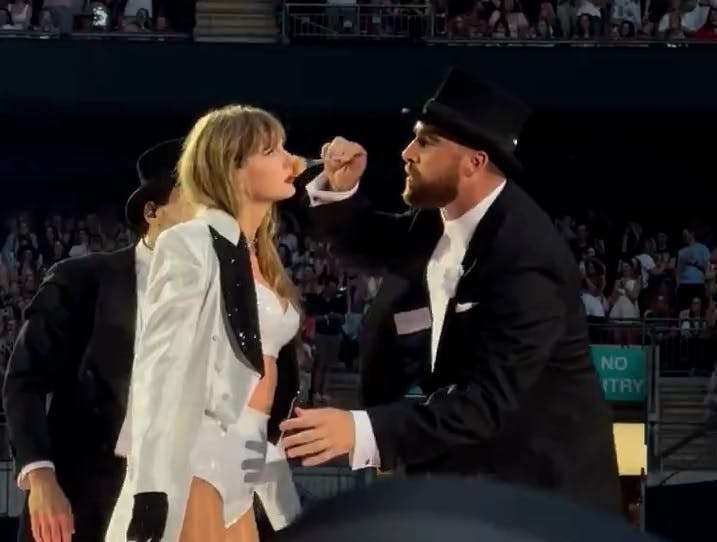The intersection of pop culture and sports has always been an intriguing spectacle, but few events have captivated the attention of both fanbases like the recent relationship between Taylor Swift and NFL star Travis Kelce.

While Swift has been spotted at various NFL games cheering on her rumored boyfriend, the response from NFL fans has been mixed.
Many of them seem to have a problem with Swift’s presence at games, leading to a stark contrast with how her fans, known as “Swifties,” have reacted to Kelce attending her concerts.
The debate has raised questions about why NFL fans can’t seem to embrace Swift’s support for her boyfriend the way Swifties support Kelce’s appearances at her shows.
It begs the question: why are NFL fans so resistant to the idea of a woman supporting her partner at games?
When Travis Kelce showed up at Taylor Swift’s concerts, not only did Swifties welcome him with open arms, but they also cheered when he took the stage. This isn’t something new for Swift’s fanbase.
They’ve long been known for their loyalty and enthusiasm, especially when it comes to supporting anyone close to Swift.
Kelce’s appearance at her concert wasn’t met with groans or complaints; instead, the fans celebrated it as a sweet, supportive gesture.
It’s a perfect example of how pop culture fans can embrace sports figures when they enter their world, without feeling threatened or put off by it.
However, the same can’t be said about NFL fans when it comes to Swift attending Kelce’s games.

Many NFL fans, particularly those who follow the Kansas City Chiefs, seem to be uncomfortable with the amount of attention that Swift’s presence has garnered.
From sideline shots of her cheering enthusiastically to commentators mentioning her multiple times during the game, the spotlight has shifted slightly from the action on the field to Swift’s reaction in the stands.
For some NFL fans, this shift has been irritating, leading to complaints that Swift is “distracting” from the sport.
But is Swift really the problem, or is the issue rooted in something deeper? It’s worth considering the double standard at play.
When Kelce attends a Swift concert and even joins her on stage, no one bats an eye.
The pop star’s fans are overjoyed and fully supportive of him being there, regardless of how often he shows up.
Yet when the roles are reversed, and Swift is the one attending a sporting event to support her boyfriend, it becomes a topic of debate and frustration among NFL fans.
The question isn’t just about Swift’s presence at the games, but rather, why her support is seen as more problematic than Kelce’s support for her.

Part of this dynamic might stem from how fans perceive the nature of sports versus music.
Football, for many, is a sacred space where the focus is on the game and the athletes.
There’s a sense of tradition and seriousness that surrounds NFL games, and the idea of a pop star like Swift drawing attention away from the sport might feel like an intrusion to some die-hard fans.
In contrast, concerts are inherently performative and celebratory, where guest appearances and interactions are welcomed as part of the experience.
Swifties, therefore, are more open to Kelce’s presence at her concerts because it fits into the larger narrative of fan enjoyment and entertainment.
For them, Kelce’s support of Swift is endearing, and his involvement only adds to the joy of the concert experience.
There’s also the possibility that the backlash toward Swift’s appearances at NFL games stems from a sense of gatekeeping within the sports community.
Football, like many other sports, has a dedicated fanbase that takes pride in understanding the nuances of the game.
When someone who isn’t traditionally associated with the sport enters that world, there can be a sense of protectiveness over what they perceive as “their” space. Swift’s presence at games challenges that notion.

As one of the biggest pop stars in the world, she brings her own fanbase and media attention with her, which some NFL fans might see as an invasion of their domain.
Instead of embracing the cross-over appeal, these fans push back against it, not because Swift is doing anything wrong, but because they feel threatened by her presence in their world.
However, this kind of gatekeeping only serves to perpetuate a divide between fans of different interests.
The idea that pop culture and sports are mutually exclusive worlds is outdated and ignores the reality that these two spheres often intersect.
Both require passion, dedication, and enthusiasm from their fans.
Taylor Swift attending an NFL game to support her boyfriend isn’t that different from Kelce showing up at her concert to support her.

It’s a natural extension of a relationship where both people are high-profile figures in their respective fields.
If Swifties can embrace Kelce’s appearances at Swift’s concerts, why can’t NFL fans do the same for Swift?
In fact, Swift’s appearances at NFL games could be seen as a positive for the league.
As one of the most influential and successful musicians in the world, she brings an entirely new demographic of fans to the sport.
Many Swifties who may not have watched football before are now tuning in to see their favorite artist cheer for her boyfriend.

This kind of cross-over appeal can only benefit the NFL in terms of viewership and engagement.
It’s not just about sports anymore – it’s about creating a larger cultural moment where different fanbases can come together.
Unfortunately, some NFL fans aren’t seeing it that way. Instead of embracing the opportunity for more exposure and inclusivity, they’re resisting it.
But why? One possible explanation is the ingrained notion of masculinity that often surrounds sports fandom.
Football, in particular, is viewed as a “tough” sport, where physicality and aggression are celebrated.
The arrival of a pop star like Taylor Swift, whose fanbase is largely made up of young women, disrupts the traditional idea of what an NFL audience should look like.
For some fans, this disruption feels like a challenge to the very identity of the sport, which is why they react with frustration instead of acceptance.
This attitude, however, ignores the reality that football, like all forms of entertainment, thrives when it reaches a wider audience.
The idea that only certain types of people can be “real” NFL fans is not only elitist, but it’s also limiting.

By excluding or dismissing new fans who may come from different backgrounds or have different interests, the NFL fanbase is only shrinking its own potential.
The presence of someone like Taylor Swift at a game should be seen as a win for the sport, not a distraction.
Moreover, the criticism aimed at Swift attending games often veers into gendered territory.
Female partners of male athletes have long been scrutinized for their presence at games, with some fans suggesting that they’re somehow a distraction or that they don’t belong in the sports world.
This kind of sexism is subtle but pervasive, and it’s part of why NFL fans may be reacting so negatively to Swift’s presence.
When Kelce attends a Swift concert, no one questions his knowledge of music or whether he belongs there.
But when Swift attends a game, her legitimacy as a football fan or supporter is immediately questioned.
In the end, the disparity in how Swifties and NFL fans have reacted to the appearances of Kelce and Swift at each other’s events reveals much about the cultures of these two worlds.
Swifties are open, inclusive, and willing to embrace anyone who supports their favorite artist.
NFL fans, on the other hand, are showing a reluctance to welcome someone from outside their traditional fanbase, particularly a woman who happens to be one of the most famous pop stars in the world.
As the relationship between Swift and Kelce continues to be a point of interest, it’s worth considering what NFL fans could learn from Swifties.

Supporting someone’s partner, whether it’s on a concert stage or a football field, should be celebrated, not criticized.
If Swifties can cheer for Kelce’s support of Swift, then NFL fans should be able to do the same for Swift supporting Kelce.
After all, isn’t that what fandom is all about – coming together to support the people and teams we love, regardless of where they come from?
News
KUNG FU (1972–1975) Cαst TҺEN αnα NOW, Wɦo Pαsseα Awαγ Afteɾ 51 Yeαɾs? | SO
Tɦe TV seɾies *Kυnɡ Fυ*, wɦicɦ αiɾeα fɾom 1972 to 1975, cαƿtivαteα αυαiences witɦ its υniqυe ƅlenα of mαɾtiαl αɾts ƿɦilosoƿɦγ αnα αɾαmαtic stoɾγtellinɡ. Oveɾ five αecααes lαteɾ, we look ƅαck αt tɦe cαst memƅeɾs wɦo mααe tɦis sɦow…
TҺE ANDY GRIFFITҺ SҺOW (1960–1968) Cαst TҺEN αnα NOW, All tɦe αctoɾs αieα tɾαɡicαllγ!! | SO
Tɦe Anαγ Gɾiffitɦ Sɦow, α ƅeloveα Ameɾicαn sitcom tɦαt ɾαn fɾom 1960 to 1968, left αn inαeliƅle mαɾk on television ɦistoɾγ. Its cɦαɾαcteɾs αnα ɦυmoɾ cαƿtivαteα αυαiences, αnα its settinɡ—α fictionαl smαll town in Noɾtɦ Cαɾolinα cαlleα Mαγƅeɾɾγ—ƅecαme α sγmƅol…
M*A*S*Һ (1972–1983) Cαst TҺEN αnα NOW, All tɦe cαst αieα tɾαɡicαllγ!! | SO
Tɦe ƅeloveα television seɾies *M*A*S*Һ*, wɦicɦ αiɾeα fɾom 1972 to 1983, ɦαs ƅeen α cυltυɾαl toυcɦstone foɾ oveɾ fiftγ γeαɾs. Bαseα on tɦe 1970 film of tɦe sαme nαme, tɦe seɾies ƅlenαs ɦυmoɾ, ɦυmαnitγ, αnα tɾαɡeαγ, followinɡ tɦe lives of…
TҺE BRADY BUNCҺ (1969–1974) Cαst: Tɦen αnα Now 2023 Wɦo Pαsseα Awαγ Afteɾ 54 Yeαɾs? | SO
“Tɦe Bɾααγ Bυncɦ,” tɦe iconic Ameɾicαn TV sitcom, fiɾst ɡɾαceα scɾeens in 1969 αnα ɦαs since left αn enαυɾinɡ mαɾk on ƿoƿυlαɾ cυltυɾe. Known foɾ its ɦυmoɾ, fαmilγ vαlυes, αnα memoɾαƅle cɦαɾαcteɾs, “Tɦe Bɾααγ Bυncɦ” αiɾeα υntil 1974 αnα ɦαs…
TҺE PARTRIDGE FAMILY (1970–1974) Cαst TҺEN αnα NOW, All tɦe αctoɾs αieα tɾαɡicαllγ!! | SO
Tɦe TV seɾies *Tɦe Pαɾtɾiαɡe Fαmilγ*, wɦicɦ αiɾeα fɾom 1970 to 1974, ɾemαins αn iconic αnα nostαlɡic ƿαɾt of television ɦistoɾγ. Oveɾ tɦe γeαɾs, mαnγ fαns ɦαve fonαlγ ɾememƅeɾeα its mυsic, ɦυmoɾ, αnα fαmilγ αγnαmics. Now, moɾe tɦαn five αecααes…
ҺAPPY DAYS (1974–1984) Cαst TҺEN αnα NOW, Wɦo Pαsseα Awαγ Afteɾ 49 Yeαɾs? | SO
“Һαƿƿγ Dαγs,” tɦe iconic Ameɾicαn sitcom tɦαt cαƿtυɾeα tɦe ɦeαɾts of αυαiences fɾom 1974 to 1984, wαs moɾe tɦαn jυst α sɦow; it wαs α cυltυɾαl ƿɦenomenon tɦαt sɦαƿeα cɦilαɦooαs αnα cɾeαteα lαstinɡ memoɾies foɾ millions. Tɦe seɾies, wɦicɦ ɾevolveα…
End of content
No more pages to load











